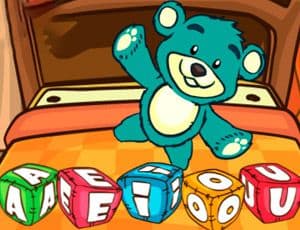Escola Games | Jogos Educativos
https://www.escolagames.com.br
Teacher's support sheet

Little Bear a, e, i, o, u
Hi buddy! The little bear woke up and is eager to play with you! Click on the dice and find out the sound of the vowels. You will also learn many words starting with vowels.

Teacher's tips
Level of Education: Preschool
Subject: English
Theme: Written language: uses and forms - Orality - Literacy
Age: 4 to 6 years old
Working with words and their initial letters in the literacy phase is fundamental to develop spoken and written language. When playing this game, students will know the vowels, visualize the written word and listen to many words starting with it, which opportunities them to think about the sounds. [FIM-DICA]
Learner outcomes
To identify and differentiate the vowels;
To acknowledge the use of the alphabet on the words;
To form words with letters;
To compare words;
To develop the ability to put letters together to form words;
To associate words with their meanings;
To improve reading and writing skills;
To learn the vowels of the alphabet;
To associate letters with their sounds;
To recite the sequence of vowels;
To see the difference between vowels and consonants;
To identify the initial phoneme of words;
To reinforce content discussed during the classes;
Teachers' goals
To promote the words' structure comprehension process;
To widen the vocabulary of the group;
To teach the word formation process using vowels;
Fixar conteúdo trabalhado em sala de aula;
To offer a playful situation so students can associate the letters with their sounds and written symbols.
Suggestions of approaches for the teacher
(Approach 1) Organize students in pairs and ask them to take turns clicking on the vowels. Stimulate them to read words and copy them on their notebooks, separated by their initial vowels.
In another moment, use their register and ask them to read the words and illustrate each. If they struggle reading some words, share the question with the other classmates and ask for help to find out which is the word.
You can also distribute different magazines to students and ask them to look for words starting with vowels. Stimulate students to read the terms they find.
(Approach 2) Vowels' Path - On the ground, draw a path using crayons with 30 spots, with numbers from 1 to 30. Make two dice using cardboard: a traditional one and another with the vowels.
Divide the group into two teams. Each one must choose a classmate to be the "piece.” At each round, students have to throw both dice.
If they get the number 3 and the vowel U, the student "piece" must say three words starting with it and then move three spaces. The teams can help think about the words. Go on until one of the teams wins.
(Approach 3) Choose some vowels and write them on the board. Then, ask students to choose a word starting with that letter and write it in their notebook.
(Approach 4) Fishing Vowels - Plan a game to 'fish' vowels and consonants. The student who gets more vowels wins.
(Approach 5) Draw animals or objects that start with vowels and ask students to name them.
(Approach 6) Form a circle with students and show them images of the vowels. Every time you show them a different vowel, make sure to pronounce it. Then, ask questions:
● Which letter is this?
● Is it in your name?
● Is there anyone in the classroom whose name starts with this vowel?
● What other words do you know that start with this letter?
(Approach 7) Word dictation - Say the word and ask students to write only the vowel that initiates the word.
(Approach 8) Illustrated dictation - Show students pictures of objects or animals and ask students to count how many vowels those words have.
(Approach 9) Vowels and consonants bingo.
(Approach 10) Play a vowels memory game. Instead of matching identical cards, students will have to associate the vowels with the name of a figure. So, they would match 'E' with 'ELEPHANT.'
More about the content
After you present students with the vowels, they must:
● Identify them by their names;
● Pronounce them clearly;
● Know how to write them;
● Mention words that start with those vowels;
● Mention people's names and places that begin with the vowels;
● Participate in the class.
To develop those skills, propose activities such as:
● To identify each vowel;
● To differentiate the words starting with each vowel's sounds;
● To write the vowels correctly;
● To recognize their names and write them correctly;
